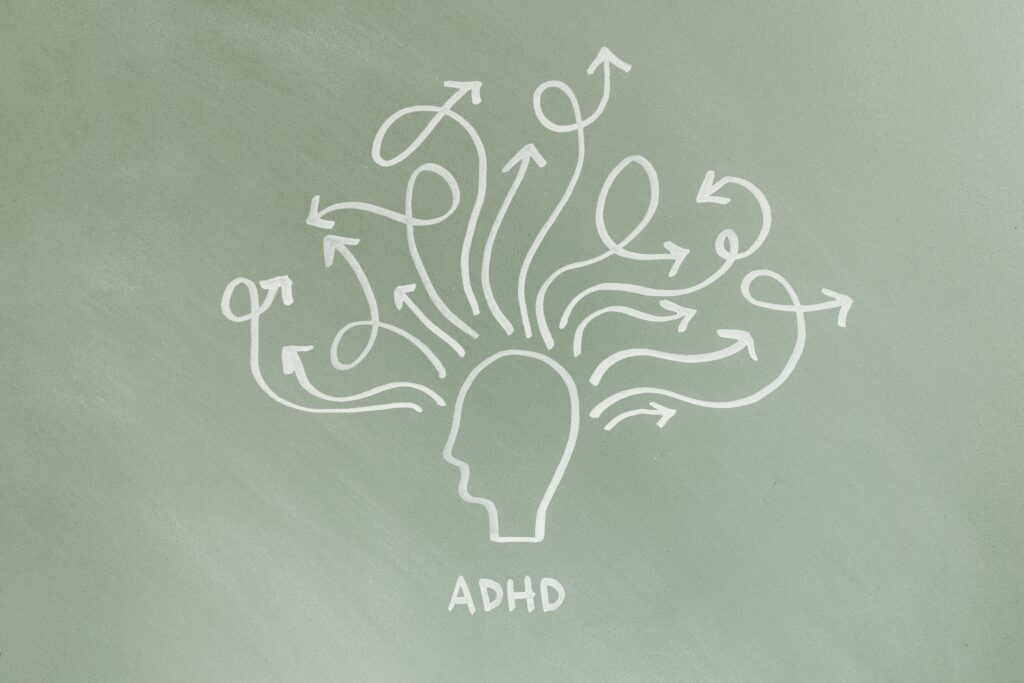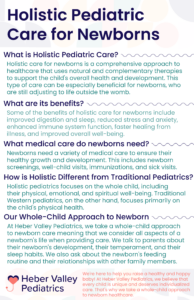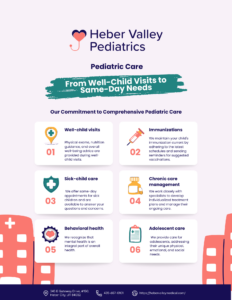
At Heber Valley Pediatrics, we believe that early diagnosis and treatment are essential for children with ADHD. Our pediatric specialists have the experience and training to provide comprehensive care for children with ADHD, including diagnosis, treatment planning, and ongoing support.
What is ADHD?
According to the CDC, ADHD is a neurodevelopmental disorder that affects attention, behavior, and activity levels. Children with ADHD may have trouble paying attention, controlling impulsive behaviors, or be overly active. The exact cause of ADHD is unknown, but scientists believe that genetics plays a role.
Why is it important to see a specialist for ADHD?
At Heber Valley Pediatrics, we believe that it is important to see a specialist for ADHD because specialists have the experience and training to accurately diagnose ADHD, develop a personalized treatment plan for your child, and provide ongoing support and monitoring.
ADHD can be difficult to diagnose, especially in young children. Specialists have the training and experience to identify the signs and symptoms of ADHD and rule out other possible conditions.
Once your child has been diagnosed with ADHD, a specialist can work with you and your child to develop a treatment plan that is tailored to your child’s individual needs. This may include medication, therapy, or a combination of both.
ADHD is a lifelong condition, so it is important to have a specialist who can provide ongoing support and monitoring for your child. Specialists can help you and your child track their progress, adjust their treatment plan as needed, and manage any challenges that arise.
In addition to these benefits, pediatric specialists for ADHD understand the unique needs of children and adolescents, can work with you and your child’s school to develop an educational plan, and can provide resources and support to the whole family.
If you are concerned that your child may have ADHD, please schedule an appointment with one of our pediatric specialists today. We are here to help you and your child get the support they need to succeed.
What are the benefits of seeing a pediatric specialist for ADHD?
- Accurate diagnosis: Pediatric specialists have the experience and training to accurately diagnose ADHD, even in young children. They can also rule out other possible conditions that may be causing similar symptoms.
- Personalized treatment plan: Pediatric specialists can develop a personalized treatment plan for your child that is tailored to their individual needs. This may include medication, therapy, or a combination of both.
- Ongoing support and monitoring: Pediatric specialists can provide ongoing support and monitoring for your child. This includes tracking their progress, adjusting their treatment plan as needed, and managing any challenges that arise.
- Understanding of child development: Pediatric specialists understand the unique needs of children and adolescents with ADHD. They can also help you and your child’s school to develop an educational plan that meets their needs and helps them succeed.
- Support for the whole family: ADHD can impact the entire family. Pediatric specialists can provide resources and support to help all members of the family cope with the challenges of ADHD.
In addition to these benefits, pediatric specialists for ADHD are up-to-date on the latest research and treatments for ADHD. They can also provide you with information and resources to help you and your child manage their ADHD at home and in school.
If you are concerned that your child may have ADHD, please schedule an appointment with a pediatric specialist today. They can help you and your child get the support they need to succeed.
What to expect when you see a pediatric specialist for ADHD
When you see a pediatric specialist for ADHD, you can expect the following:
- Comprehensive evaluation: The specialist will start by asking you and your child a series of questions about their symptoms, medical history, and family history. They may also ask you to fill out a questionnaire or rating scale. The specialist may also observe your child interacting with others or perform a physical exam.
- Diagnosis: Once the specialist has gathered all of this information, they will make a diagnosis of ADHD or rule out other possible conditions.
- Treatment plan: If your child is diagnosed with ADHD, the specialist will work with you to develop a treatment plan. This may include medication, therapy, or a combination of both. The specialist will also provide you with information on how to manage ADHD at home and in school.
- Ongoing support and monitoring: The specialist will continue to see your child on a regular basis to track their progress and adjust their treatment plan as needed.
Here are some additional things to expect when you see a pediatric specialist for ADHD:
- The specialist will take the time to get to know your child and their individual needs.
- The specialist will be respectful of you and your child’s choices.
- The specialist will work with you to develop a treatment plan that is right for your child and your family.
- The specialist will provide you with support and guidance as you manage your child’s ADHD.
If you have any questions or concerns about the evaluation or treatment process, please be sure to talk to the specialist. They are there to help you and your child get the best possible care.
Treatment options for ADHD
There are a variety of treatment options available for ADHD, including medication, therapy, and lifestyle changes. The best treatment for you or your child will depend on the severity of your symptoms and other factors such as age, health, and lifestyle.
Medication
Medications are the most common treatment for ADHD. Stimulant medications are the most effective type of medication for ADHD. They work by increasing the levels of dopamine and norepinephrine in the brain, which can help to improve attention and focus. Non-stimulant medications are also available, but they are not as effective as stimulant medications.
Therapy
Therapy can be a helpful treatment for ADHD, especially for children and adolescents. Cognitive behavioral therapy (CBT) is a type of therapy that can help people with ADHD to identify and change negative thinking patterns and behaviors. Other types of therapy, such as social skills training and parent training, can also be helpful.
Lifestyle changes
Lifestyle changes can also help to improve ADHD symptoms. Getting regular exercise, eating a healthy diet, and getting enough sleep are all important for people with ADHD. Other lifestyle changes, such as creating a structured routine and avoiding distractions, can also be helpful.
Combination therapy
For some people, a combination of medication and therapy is the most effective treatment for ADHD. This can help to address all aspects of ADHD, including attention, impulsivity, and hyperactivity.
It is important to note that there is no one-size-fits-all treatment for ADHD. The best treatment for you or your child will depend on your individual needs.
Find a Pediatric Specialists for ADHD
If you are concerned that your child may have ADHD, please don’t hesitate to contact Heber Valley Pediatrics today. Our team of pediatric specialists is here to help you and your child get the support you need.






2 comments